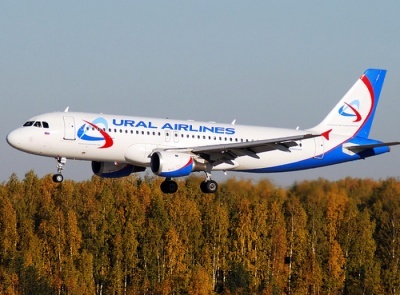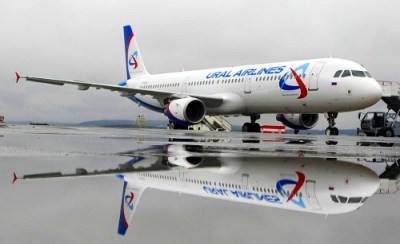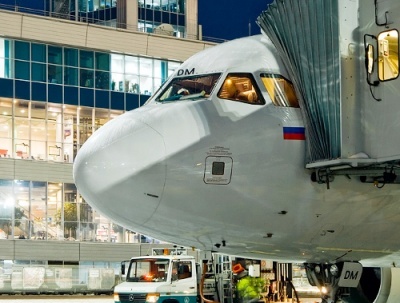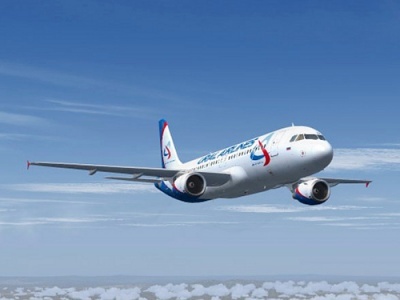 |
Home page / News & Analysis
/ Latest news
/ Sergei Skuratov: "Ural Airlines is going to increase its fleet every year"
|
|
|
Sergei Skuratov: "Ural Airlines is going to increase its fleet every year"
18.02.2011 — Analysis Ural Airlines is one of the top ten major Russian airlines for volume of traffic. In an interview with Vadim Dynin, the head of "RusBusinessNews", the airline's general director, Sergei Skuratov, spoke about how they became leaders in the sky, what airport is the safest in the world, and why German pilots might well envy their counterparts in the Urals. - Mr. Skuratov, Ural Airlines will always remember 2010 as a record-setting year - you carried 1.8 million passengers. Would it be fair to say that this success was due to two factors - that Russians were flying more often and they were choosing Ural Airlines more often? - In general, the financial crisis dealt a serious blow to Russian air transportation. But I have to say that 2009 was a better year than 2008 - we saw a 3% increase. And we flew 20% more passengers in 2010, in comparison to 2009, as well as 30% more cargo. There were two primary factors. First of all, there was a strong, pent-up demand throughout the country for air travel. The financial crisis made everyone nervous and they stopped flying. But once things started to stabilize, people started to travel again and take trips. And of course, the airline's operation. We bought new Airbuses and began flying out of more cities, especially major cities where, for one reason or another, their home airlines had gone out of business, like in Samara, Ufa, and Krasnoyarsk.
- How did you manage to increase your volume of traffic when airlines around you were dying? - It's all about the efficiency of your business and how it's structured. We're building a business based on our resources. We get no government subsidies and take out no unnecessary loans. We have a good credit history and a good relationship with our banks and leasing companies. We all speak the same language, because for the past six years we've been audited by Western audit firms. It's fairly easy for us to get the credit we need. But, I repeat, only the credit we really need. We have a small loan portfolio - our money is invested in our airplanes and our ground service. In the first quarter of 2011, we will have eighteen Airbuses, including five A321s, so we can we can fly to more cities. We've learned how to operate these planes - using European standards, they should be flown 400 hours a month. As a result, we're flying more than 4,000 hours a year. - Is that the model Western European companies use? - For the most part, yes. - But at the same time, Ural Airlines is not a low-cost airline... - No, our planes have a business-class section. And they operate fairly efficiently this way. Low-cost airlines in Russia are nothing but slogans. Right now we don't have many airports where you can fly cheaply, like you can with Western low-cost airlines. - The tragedy that happened over New Year's, when the Kogalymavia airliner exploded in Surgut, was a reminder that regional companies continue to use the Tu-154. In the heat of the moment, those companies promised to ground those planes as soon as possible. But Ural Airlines has Tu-154s in its fleet. Are there problems in Russia with the Tu-154 and what should be done about it? - There is no problem, that's a completely contrived idea. That was a special situation, a disaster that could have happened to any type of airliner, including an Airbus or Boeing. The Tu-154 is a pretty reliable plane - it's a tough Russian machine. It was a Tu-154B that exploded in Surgut and we haven't used those in a long time. We have four Tu-154Ms in our fleet. Those are slightly different planes and they have the necessary certifications and permits to operate in Europe. We bought them at the plant where they were manufactured in the configuration that we needed. They fly to airports that can't accept Western planes because of problems with the quality of the runways, for example, in Mineralnye Vody and Anapa. - Last year you added new routes every quarter, to both domestic and overseas destinations. Has there been enough demand to justify those additions? And can we expect to see Ural Airlines continuing to expand its network in 2011? - We have a lot of seasonal fluctuation. The summer is very busy, but some routes just break even or even operate at a loss in the wintertime. But we make money in the summer and the routes are profitable, so we will continue to offer them next year. The 2011 schedule is already 80% complete. We will be operating 25% more flights than in 2010. We carried 22% more passengers in January and February of this year, compared with the first two months of last year. And this growth will continue, because we're going to increase our fleet of planes every year.
- Ekaterinburg's Koltsovo airport is one of your home airports. Can you use new types of aircraft there, in order to increase your passenger load? - Koltsovo and Moscow's Domodedovo are our home airports, where we've created our engineering service. We have smaller hubs in Samara, Ufa, Kazan, Krasnoyarsk, and St. Petersburg. To a certain extent, we feel a responsibility as the home airline to help develop Ekaterinburg as an airline hub - first of all, to operate more frequent flights. This year we began flying to Krasnoyarsk. I think there will be two flights a week in the summer. We've opened routes to Ufa, Kazan, and Samara on the Airbus, and we'll increase the frequency of those flights during the summer. We're increasing the number of flights to Mineralnye Vody, Sochi, Krasnodar, Gelendzhik, and Anapa, and we're going to have several flights to Ukraine, to Kiev and Sevastopol. The network of routes out of Koltsovo is increasing annually at a faster pace than in any other city in Russia. This is a major achievement for us. Koltsovo has excellent customs and border protection services, and that's extremely important for an international airport. They stay really busy in the summer, when up to 15 of our flights leave Ekaterinburg every morning headed for overseas resorts.
- Of course, it's the pilots, more than the airplanes, who really make a name for an airline. What kind of pilots work for Ural Airlines today, and it is considered prestigious to sit at the controls of your Airbuses? - Over half of our pilots fly under ICAO category 3A minimal conditions - 15 meters below the cloud line with 200 meters of visibility during the landing approach. That's the meteorological minimum limit in Russia. That's why, for example, many other airlines send their planes to alternate airports when there are really bad weather conditions at Domodedovo, but Ural Airlines' planes can still land. It's difficult to maintain this level of skill, because it means that our pilots have to be screened more rigorously and have additional training, and this requires additional equipment and expense. But we do it, and now we can land under the most adverse weather conditions at airports in Moscow, St. Petersburg, and the European hub airports - Paris, Frankfurt, Munich, and London. This is our qualitative advantage - reliability and safety for our passengers. Today it's considered prestigious to fly for Ural Airlines, because the pay is very good. And I'm glad that our salaries are on a European level, especially considering Russia has only a 13% income tax, compared with 50% in Germany.
- Ural Airlines currently flies to many capital cities - Rome, Prague, Sofia, Beijing, and Tel Aviv. Is the fact that you can get permission to take off and land in foreign capitals a measure of your level of skill? - The airline's credit history, plus our fleet of airbuses, opens up the runways for us at airports in major cities. We can speak the same language today. When we say that we're landing an A320, they just give us a ground-handling contract. But when a Tu-154 comes in, questions come up. They don't have the people or equipment to work with them. Another point is the SAFA inspection. When one of our planes is at a European airport, it's closely inspected for reasons of flight safety. They verify that the crew can understand English. As of March 1, 2011, the pilots should be at level 4, meaning almost fluent. The equipment has to meet European standards. We have a very low rate of violations. In terms of the preparation of our aircraft and crew, we're among the best in Russia. In 2009 we were the best in the country, even ahead of Aeroflot. It took us four years to get permission from the Chinese to fly into Beijing - for some reason they kept turning us down. It's fantastic having a flight from Ekaterinburg to Beijing. Right now, you can buy Ural Airlines tickets anywhere in China, but the main thing is that you have to transfer in Beijing. We get a lot of connecting passengers on their way to Japan and Southeast Asia. - You were planning to buy completely new Airbuses in 2011. In addition, Ural Airlines' management was looking at long-haul A-330s. Have your plans changed? - The project to buy the airplanes directly from the factory we had to postpone for two years. You have to understand that the financial crisis dealt a serious blow to the global airline industry. And since the path out of the financial crisis is still somewhat unclear, we just can't allow ourselves to launch a $350-$400 million-dollar project. Many companies in the world are finding themselves in the same situation. But in 2011 we will lease three A321s (220 seats) and one A320 (156 seats). In addition, by May we will have reequipped our entire fleet of A320s (12 planes) to seat 156 passengers, including 12 traditional business-class seats. Whether or not we buy A330s will depend on the demand - they need a market where they can fly 6,000 hours a year. Right now our company has an appropriate market for one and a half planes, but we would need a market for at least three. And we would later buy between five and seven. Passenger traffic is growing in Russia, so the project to buy these aircraft is a realistic one. If you look at the proposed route network, you see a radius from Ekaterinburg to Thailand, Goa, Hainan, and Beijing, possibly South Korea, as well as direct flights to Vladivostok, Khabarovsk, and Petropavlovsk-Kamchatsky. - There have been two emergency situations at Moscow's Domodedovo airport, which is Ural Airlines' second hub, since December of 2010. The airport was paralyzed by freezing rain right before New Year's and there was a horrible terrorist attack in January. What needs to be done to avoid a repetition of these events? - We shouldn't overreact. The disaster in December was a rare event. There's a problem with the backup power supply for civil aviation airports. This is a chronic problem and everyone keeps turning a blind eye to it. The regulatory documents allow two overhead power lines - the main one and a backup. At military airports, one line has to be an underground cable. You just have to extend the same rule to civilian airports. Domodedovo is not a bad airport - it's one of the top three in Russia. I'm sure the security will improve there. But no airport in the world is safe from a terrorist attack. You just have to fight terrorism at the airport as well. You have to restructure the work of the security services. After all, a fence is just a stopgap measure. In the end someone will just put up a ladder. You need comprehensive measures to ensure security. And you don't have to reinvent the wheel, just look at what they do in Tel Aviv. The security system at Ben Gurion Airport is fantastic. But there they mostly work with people, not suitcases. They question passengers and look into each person's eyes. And they uncover all kinds of potential threats that way. Right now we don't look in people's eyes - we're busy looking at the screens of scanners. But that's only part of the solution. - And now for the biggest question passengers are really interested in, what sort of prices for air travel can we expect to see in 2011? - Overall, prices were lower In 2010 than in 2009. The financial crisis knocked them down and some airlines who were state-supported were offering fares that were cheaper than a comparable train ticket. That's bad - that keeps airlines from growing. We haven't had any price increases so far in 2011. They're staying at last year's levels. But the price of fuel at Russian airports went up 23% between November and mid-February, which is outrageous. Prices abroad are increasing, but not as much. And right now jet fuel is more expensive in Russia than overseas. When the government talks about fuel they always mean gasoline - they never mention jet fuel. But it's time to pay attention to it. Fuel costs account for 30% of a ticket on an Airbus, and more than 50% of a ticket on a Tu-154. That's the real reason they're not flying those Russian planes anymore. They're good, reliable planes, but very thirsty. Naturally, with the price of jet fuel, our fares are going to increase, but not so much as to frighten off passengers, only 3-5%. It's a good time to remember our slogan at Ural Airlines, "Your Dreams - Our Wings," so we can help dreams come true.
|
| Regions | Project participants | Investment projects | Consulates and Trade Offices | News and Analysis | About the Project |
|
© RusBusinessNews, 2009. All rights reserved. Establishing a hyperlink to RIA RusBusinessNews is required for using any of the material published on this website. News and analytical reviews are translated into foreign languages by the TRANSLIT Translation Agency |
«Sum of technologies»® Web design Site promotion |




